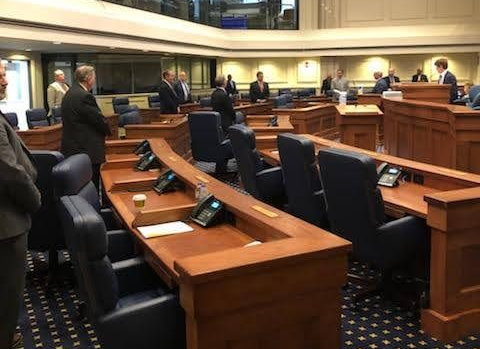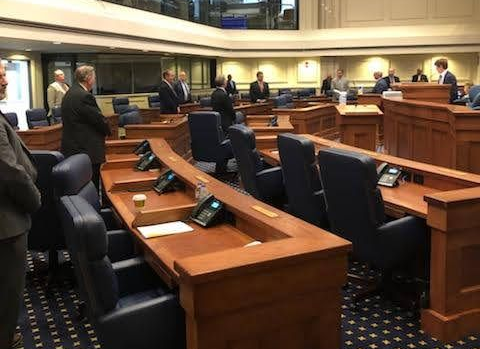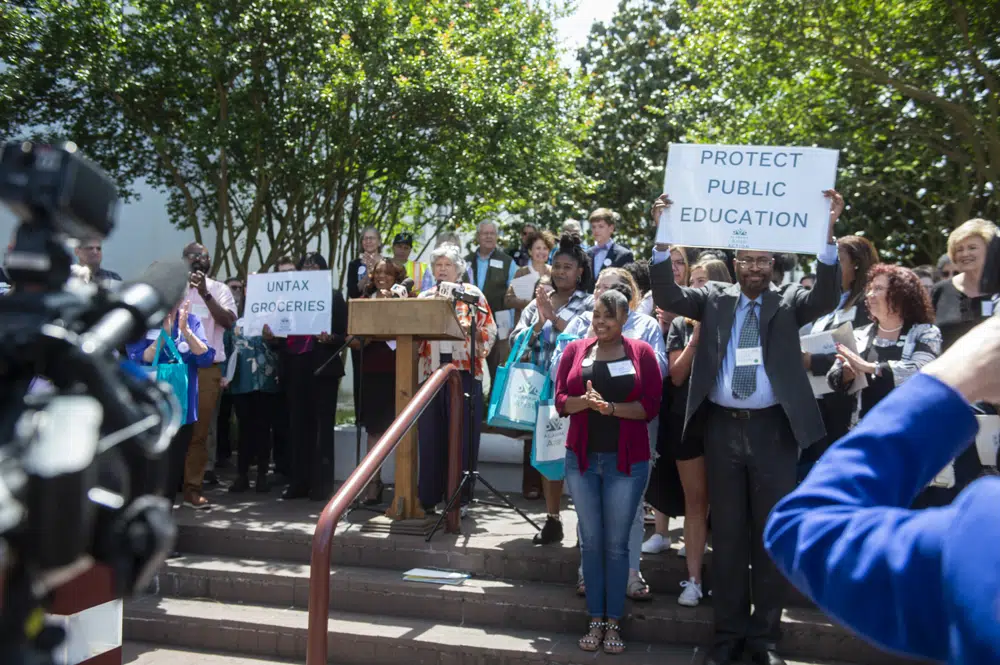Senate passes changes to open records law

On Thursday, the Alabama State Senate passed legislation for governments to respond to requests for records. Senate Bill 196 (SB 196) is sponsored by State Senator Arthur Orr, R-Decatur. SB196 changes the Alabama open records law. SB196 establishes procedures for requesting and obtaining public records. Every citizen has a right to inspect public records. The citizen requesting the record is required to provide a written request and may have to pay a fee in order to receive a certified copy. These “public records” do not include a record of the judicial branch of state government. “A citizen may request access to a public record by delivering the request by hand or by mailing the request to the public officer having custody of the public record. A request for access to a public record may be made electronically if the public officer having custody of the public writing has established a written process for accepting electronic requests. A request for access made pursuant to this article shall identify the requested public record with reasonable specificity.” “For purposes of this article, receipt of an electronically received request occurs when the public officer acknowledges receipt of the request in writing to the requester. The public officer shall promptly, but in all cases not more than 10 business days after the date of receipt, acknowledge receipt of the request.” Once the public official has acknowledged the formal request and provided a receipt, the “public officer shall promptly, but in all cases not more than 20 business days after the date of receipt of the request, make one or more of the following responses to the requester in writing: (1) Respond that access to the requested public records will be provided at a set time, place, and location during regular business hours or at a time, place, and location mutually agreeable to the public officer and the requester. (2) Respond with an estimate of the costs for copying and production of the requested public records. (3) Deny the request in full. (4) Deny the request in part and grant the request in part by providing access to or an estimate of cost for copying and production of the requested public records that are not withheld or that have been redacted, excised, or deleted in order to remove the portion of the record in which an exemption, prohibition, or exception applies. (5) Deny the request, in whole or in part, on the grounds that the public officer is not the custodian of the requested public record and, if known to the public officer, identify the custodian to the requester. (6) Deny the request, in whole or in part, on the grounds that, to the best of the public officer’s knowledge, the requested record does not exist within the governmental agency.” “If the public officer reasonably believes the amount of time and resources needed to comply with the request within the time required by this section will prevent the public officer or his or her staff from meeting their operational responsibilities, the public officer shall provide the requester the opportunity to limit the scope of the request so that it can be processed in an agreed upon time between the public officer and the requester. “ “A public officer may revise the initial reasons for a denial by sending the requester the revised reasons for the denial not more than 30 business days after the initial denial.” “A public officer shall not be required to create a new public record if the record requested does not already exist. (g) Failure by a public officer to respond in accordance with this section to a request shall be deemed a denial of the request and shall constitute a violation of this section.” “The disclosure of nonpublic or sensitive information constitutes a violation of this section if the public officer has made no effort to narrow the scope of the request or otherwise provide for proper disclosure under subsection (b). (h) This article is not intended to and does not affect any protections for sensitive or other nonpublic information provided under applicable law.” The legislation does not actually have criminal penalties for public officials who break this law. The state of Alabama has a history of exceptionally weak open records laws. SB196 passed the Alabama Senate 33 to 0. It now moves to the Alabama House of Representatives for their consideration. To connect with the author of this story or to comment, email brandonmreporter@gmail.com.
Greg Reed says bill to reduce grocery tax gaining momentum among GOP state Senators

On Thursday, the Alabama Senate passed the largest education budget in Alabama’s history. Between the $8.9 billion FY2024 education trust fund (ETF) and the $2.8 billion FY2023 supplemental appropriation, the total appropriation shattered every revenue record in state history. The great economy and the newfound wealth are forcing legislators to set priorities and ask hard questions about what they really want to accomplish in the next four years. The problem with money, especially new money, is that everybody has their own ideas about what to do with it. Every school in the state and every university wants more money than they received last year. Ditto with almost every state agency funded in the education budget. The Alabama Department of Education is presenting legislators with a myriad of plans to create or expand programs it claims will improve the dreadful educational performance in the state. The Alabama Department of Commerce has requests for renewed and expanded economic incentives. The Alabama Department of Corrections, which is normally largely funded in the state general fund budget (SGF) rather than the education trust fund (ETF), wants $100 million in education dollars to build education facilities on the sites of their new megaprisons in Elmore and Escambia Counties. There were even calls from Montgomery legislators for $30 million to build a dubious water rafting theme park. Every University or nonprofit group has presented the legislature with their plans to build a new building, center, or program. In her State of the State address, Governor Kay Ivey promised every Alabamian a $400 check in their mailbox. School choice advocates are asking for education dollars to follow the child out of Alabama’s troubled public school system with the PRICE Act. Four legislators have presented plans to reduce or eliminate the state’s four percent sales tax on groceries. Legislators are talking about lowering the state’s corporate income tax rate. The Alabama House of Representatives actually passed legislation eliminating the income tax on hourly workers working overtime. There are also calls to save money in this record revenue year in anticipation of the next economic downturn. With 140 different legislators, there are 140 different ideas about how to spend the state’s revenues. “We cannot do it all,” said Sen. Arthur Orr, who chairs the Senate Finance and Taxation Education Committee, told reporters following passage of the budget package Thursday. Senate Pro Tem. Greg Reed agrees. “We can’t do all of it,” Reed said. “There is a slew of tax cuts ideas coming,” Orr said. “How are we going to afford it?” “We need to be careful that we don’t cut too many taxes,” Reed said. Reed indicated that the plan most likely to move forward is the plan to reduce grocery taxes. “When you talk to the members, you will hear more about the grocery tax than any other,” Reed said. Alabama Today asked Orr if the $45 million tax cut for hourly workers that passed the House on Tuesday was in the budget that passed the Senate on Thursday. “No, it was not,” Orr said. The Senate does plan to save some of the money in a new reserve account. “Half a billion dollars is going into a savings account which is where we’re going to put the rebate money to take care of future needs, particularly because we’re concerned about the future of the economy,” Orr said. The Senate also downsized Governor Ivey’s rebate plan from $400 per tax filer to $105, saving approximately $700 million. The Senate eliminated plans to spend $30 million on a new healthcare-focused boarding school in Demopolis. That was replaced with a $500,000 study to study the feasibility of the plan and what would be the best site for the plan. The Senate rejected an amendment by Sen. Bobby Singleton that would have restored $2 million of funding for the school. “I would like to thank this body for telling little babies in West Alabama that they don’t mean anything,” Singleton said after losing the vote, “Thank you, this is why we will always be number 50.” The Senate budget also cut out the plan to provide $30,000 million to Montgomery, including the plans for the controversial water park. “I am very concerned that the capital city will be completely left out of the supplemental,” said Sen. Kirk Hatcher. “I am pleading with you to help with this.” The legislature did advance a controversial bill to provide a bridge loan to cash-strapped private college Birmingham Southern College. That bill is sponsored by Sen. Jabo Waggoner – a Birmingham Southern Alum. The budget package now goes to the Alabama House of Representatives for its consideration. The House has already passed the state general fund budget (SGF). The SGF could come out of committee in the Senate as early as Wednesday, but sources think it likely will be another week. “This is an unprecedented budget and an unprecedented time,” Orr said. Wednesday was Day 18 of the 2023 Alabama Regular Legislative Session. To connect with the author of this story or to comment, email brandonmreporter@gmail.com.
Gov. Kay Ivey signs adoption reform bill

On Tuesday Alabama Governor Kay Ivey signed legislation that will update and reform Alabama’s adoption laws. “Alabama is, once again, putting families first and taking action to solidify us as the most pro-life state in the nation,” said Gov. Ivey. “Alabama has consistently set state records for adoptions and placed thousands of children in loving, forever homes. Currently, we have more than 5,000 children in the foster care system, and with this modernized and streamlined process now in place, we have positioned Alabama on even firmer footing and will be able to provide more of our children with the life they deserve. This bill has been over four years in the making, and I commend Rep. Ginny Shaver and her colleagues in the Alabama Legislature, as well as the Alabama Law Institute, for making this a top priority and fighting for our state’s children.” House Bill 101 will modernize and improve the state’s adoption process. HB101 was sponsored by State Rep. Ginny Shaver. The adoption reform legislation was carried in the Alabama Senate by State Senator Arthur Orr. “This is a Law Institute (ALI) bill,” Shaver said. “I started working on a bill and found out that they already had a committee working on rewriting the state’s adoption code.” “Alabama’s adoption law has not been touched in 30 years,” Shaver said. The rewritten 80-page bill “is very comprehensive and detailed.” The Legislation includes some protections for parents who have religious, moral, or other concerns about vaccinations can participate in foster and adoptive care. The bill states, “The Department of Human Resources shall provide by rule the process through which an individual seeking to participate in foster care or adoption may apply for an exemption from any vaccination requirement for religious or other appropriate reason for himself, herself, or any other individual in his or her household.” “This has been a long time coming,” Orr said of the legislation. “We will move children more rapidly through the process of adoption and will remove needless hurdles.” Thursday was day 18 of the 2023 Alabama Regular Legislative Session. To connect with the author of this story or to comment, email brandonmreporter@gmail.com.
Senate Committee advances education budget package

On Wednesday, the Finance and Taxation Education Committee approved over $11 billion in funding for education. State Senator Arthur Orr is the Chairman of the Senate Finance and Taxation Education Committee “This has been the most trying budget in my 14 years as a budget chairman,” Orr said. “To add something, you have to cut something. There are so many decisions in writing a budget. We did receive a budget from across the street. Some things I understood. There were some things there I didn’t understand.” $8,798,591,041 is in the 2024 fiscal year Education Trust Fund (ETF) budget itself – SB88. That is an increase from $8,261,590,649 in 2023 to $537,000,392—a 6.5% increase over the 2023 education budget. K-12 will increase from $5,626,390,769 in 2023 to $5,988,821,987 in 2024. Higher Ed will be increased from $2,116,780,588 to $2,258,619,038. The many other agencies in the ETF will be increased from $518,419,292 to $551,153,016. That is a decrease of $18,350,000 from Gov. Kay Ivey’s budget request. The actual ETF budget could have been much greater. An $11 billion ETF with different priorities and accounting was a real possibility. A large part of the budget package was not in the FY2024 ETF but was instead in a massive $ $2,787,667,309 supplemental appropriation to the already record 2023 education budget –SB87. This is in addition to the $8,261,590,649 already appropriated for education in the current 2023 budget year. 2022 and 2021 also saw massive supplemental appropriations bills swelling the dollars spent on education in those fiscal years beyond the ETF budgets. SB101 created the Educational Opportunities Reserve Fund, which functions as a second state savings account for when revenue collections fall below projects. Orr explained that the goal is to create a “waterfall” effect, where funds flow to funds so that in a 2009-style economic crash, there would still be funds to avoid proration. Orr warned that as of the end of April 2023, tax collections for the ETF are $30 million below what they were at this time in 2022. The most significant change between the Governor’s plan versus the Senate Committee plan is that the Governor’s generous tax rebate – SB86 – has been cut from $400 per tax filer to just $100 per filer. Orr explained that the cost of the governor’s rebate would have been $1,030,000,000. The cost of the much smaller committee rebate is $275 million. That is paid for in the supplemental appropriation for 2023. The Committee passed a pay increase for educators – SB85. All education employees will get a two percent across-the-board pay increase. Sen. Orr explained that the Legislature passed a salary matrix for teachers last year. “Teachers get at least a one percent step increase every year no matter what the Legislature does.” With the two percent across-the-board increase plus the one percent annual step increase, the teachers will get a three percent increase effective on October 1. Orr said the Legislature is considering creating a similar matrix for education support staff. Orr said that the Legislature is considering creating a “floor” for education support staff. The problem that the Legislature is running into is that teacher’s aides, janitors, lunchroom workers, secretaries, and school bus drivers pay scales vary widely from local system to system. SB269 established the K-12 Capital Grant Program within the Office of the Lieutenant Governor to provide grants to local schools to assist with capital projects, deferred maintenance, or technology needs. All the bills in the education budget package received favorable reports from the Committee. Traveling within the budget package is a controversial proposal to give private college, Birmingham Southern, a $30 million dollar loan to keep the struggling liberal arts institution afloat. Without a bailout of some sort, the college would be forced to close, the president said. SB278 is sponsored by Sen. Jabo Waggoner. The full Senate could consider the whole education budget package as early as Thursday. The House has already passed the state general fund budget (SGF) – the other half of the twin budgets that the state passes every year. Thursday will be day 18 of the 2023 Alabama Regular Legislative Session. To connect with the author of this story or to comment, email brandonmreporter@gmail.com.
House Speaker Nathaniel Ledbetter is optimistic about cutting grocery tax

On Tuesday, Speaker of the House Nathaniel Ledbetter said that he was “optimistic” about passing a grocery tax cut in the current legislative session. Currently, the State of Alabama taxes groceries at a rate of four percent. Alabama is one of only a handful of states that charges a sales tax on foodstuffs. The state had over $3 billion in surpluses that rolled over from fiscal year 2022 to fiscal year 2023 on October 1. Most of that is in the education trust fund (ETF)) that rolled over from fiscal year 2022 to fiscal year 2023 on October 1. Before the session, there was talk of giving a one-time tax rebate to every income taxpayer. Governor Kay Ivey included that proposal in her State of the State address in March. Ledbetter said that the leadership has been polling members and the public on tax cuts versus a tax rebate, and the consensus of the Republican Caucus is to do tax cuts. “We asked them (House members) rebates or tax cuts, and they said tax cuts,” Ledbetter said. “We have moved in that direction.” A recent poll by the Alabama Republican Party showed that voters preferred cutting the grocery tax from 82 percent to 18 percent. “I like Lieutenant Governor [Will] Ainsworth’s plan,” Ledbetter said. “I think we have got to be cautious. What we are talking about spending is going to take a big chunk from the ETF,” Ledbetter said. “We need to be conservative with our spending.” The legislature will consider the state general fund (SGF) budget in the next few legislative days. The education trust fund budget (ETF) should be coming out of committee in the Senate within the next two weeks. “I am optimistic,” Ledbetter said of cutting the grocery tax. Ledbetter said that the House is looking at Sen. Arthur Orr’s bill that phases out the grocery tax over time. “It is very possible that we are going to see some changes,” Ledbetter said. Ledbetter warned that there have been “billions and billions of dollars dumped into Alabama by the federal government.” The Speaker expressed concern about what state revenues will look like once those federal COVID relief dollars work their way out of the systems and tax receipts come down in the future. “We have got to be cautious,” Ledbetter warned. A reporter asked Ledbetter when a decision would be made on whether or not to pass a grocery tax cut. “Within the next 15 legislative days,” Ledbetter responded. Most Alabamians pay between 7 and 11 percent sales taxes on groceries. The state tax is only 4 percent. The rest is county, municipal, and/or school district taxes. If the state legislature repeals its grocery tax, those remaining local taxes on food will remain in place. The Alabama Legislature is meeting on Wednesday for the 12th legislative day of the 2023 Alabama Regular Legislative Session. To connect with the author of this story or to comment, email brandonmreporter@gmail.com.
Senate Committee advances legislation to bar protests at individual residences

On Thursday, the Alabama Senate Veterans and Military Affairs Committee voted to advance legislation prohibiting protests and picketing outside individual residences. Senate Bill 199 is sponsored by State Senator Arthur Orr (R-Decatur). Orr said that this legislation was inspired by the protests outside of Justice Brett Kavanaugh’s house following the release of a draft opinion overturning the Roe v. Wade decision. Orr said, “Protesters come out to the house and protested on the sidewalk with bullhorns and created a nuisance.” Orr said that he felt that the state of Alabama did not want that, so he drafted legislation to ban such tactics. “I showed it to Judiciary Chairman [Will] Barfoot, and he had some ideas,” Orr said. Sen. Will Barfoot said, “No person at or near a person’s residence. I think that is pretty vague. I think we need to tighten that up.” Sen. Andrew Jones is the Chairman of the Senate Veterans and Military Affairs Committee. The synopsis states, “This bill would prohibit a person from picketing or protesting at or near the residence of any individual intending to harass or intimidate. This bill would require law enforcement officers to ask a person who is protesting to peacefully leave the premises before placing that person under arrest.” This offense would be a class C misdemeanor. If local law enforcement can’t or won’t enforce this statute, it authorizes the Alabama Law Enforcement Agency to do so. This legislation would allow municipalities or counties to adopt ordinances or resolutions to regulate the time and noise level of any picketing or protesting in a residential area and provide criminal penalties for violations.” The committee voted to give SB199 a favorable report. It could be considered by the full Senate as early as Tuesday. While the protests outside of Supreme Court Justices’ homes made national news, there have been instances of protests outside of individual residences in Alabama. Protesters protested outside the home of Hoover Mayor Frank Brocato following the shooting of Emantic “E.J.” Bradford Jr. in the Galleria Mall by a Hoover police officer. In the case of the Supreme Court Justices, legal experts generally agree that targeted, stationary protests outside of a justice’s home are already prohibited under federal law — an effort to protect judges from undue pressures or influence. U.S. Sen. Katie Britt and other Republicans maintain that the Biden administration ordered the federal marshals to protect the judges but not to remove the protestors. Tuesday will be day 11 of the 2023 Alabama Regular Legislative Session. The Alabama Constitution limits the Legislature to no more than thirty legislative days during a regular session. To connect with the author of this story or to comment, email brandonmreporter@gmail.com.
Adoption bill passes Senate with vaccination amendment attached

On Thursday, the Alabama Senate passed legislation simplifying Alabama’s complex adoption laws, speeding up the process of children finding permanent homes. The Senate included an amendment that would allow families with vaccine skepticism to be able to be involved in the foster care program. House Bill 101 is sponsored by State Rep. Ginny Shaver. The adoption reform legislation was carried in the Alabama Senate by State Senator Arthur Orr. “This is a Law Institute (ALI) bill,” Shaver said when the bill was in committee. “I started working on a bill and found out that they already had a committee working on rewriting the state’s adoption code.” Shaver explained that the Alabama Law Institute had a committee of judges and lawyers who met on a conference call every two weeks for the last four years to modernize and improve Alabama’s existing adoption statutes. “Alabama’s adoption law has not been touched in 30 years,” Shaver said. The rewritten 80-page bill “is very comprehensive and detailed.” Shaver said that the new legislation divided minor adoptions versus adult adoptions. It also clarifies which court is the proper court, allows courts handling adoptions to work together and communicate, allows for electronic communication, provides rules for a contest of adoptions in certain situations, and clarifies procedures about relatives and stepparents who adopt a minor. Orr did add some amendments in the Senate. The first was a “technical amendment” and came from ALI and Shaver. “This came from ALI and Rep. Shaver, the sponsor,” Orr explained. “It cleaned up some wording about grandparents.” The second amendment deals with vaccinations and was negotiated by Orr with the Alabama Department of Human Resources (DHR). “I spent a good while talking to Commissioner [Nancy] Buckner, and she and the Department support this,” Orr said. “It is not the same amendment that was offered in the House that there was some controversy about.” “The Department of Human Resources shall provide by rule the process through which an individual seeking to participate in foster care or adoption may apply for an exemption from any vaccination requirement for religious or other appropriate reason for himself, herself, or any other individual in his or her household.” The Senate adopted both of the amendments. “This has been a long time coming,” Orr said of the legislation. “We will move children more rapidly through the process of adoption and will remove needless hurdles.” Sen Rodger Smitherman said, “I want to commend ALI. ALI is a collection of legal minds from all over the state.” “I am on the ALI board of directors, so I got to see the committee work on this,” Smitherman said. Orr said that the legislation has “lots of changes” to Alabama’s adoption laws “that will certainly expedite the process.” “I would like to thank DHR. They have a lot of challenges,” Orr said. The Senate voted to pass HB101 30 to 0. The legislation now goes back to the Alabama House of Representatives for them to consider the changes that were made by the Senate. The Legislature will return on Tuesday for the 11th legislative day of the 2023 Alabama Regular Legislative Session. To connect with the author of this story or to comment, email brandonmreporter@gmail.com.
Alabama legislature advances Governor’s “Gameplan” economic incentives package

On Thursday, both the Alabama House of Representatives and the Senate voted in favor of portions of Alabama Governor Kay Ivey’s “Game Plan” legislative package. “The Game Plan will position Alabama for a new era of vigorous growth, allowing us to continue our record-breaking economic development success while providing new levels of support for the state’s innovation economy,” said Gov. Ivey. “This package will benefit all Alabamians, those living in both urban centers and rural areas, and ensure our citizens are ready for high-paying careers.” “The Game Plan — our plan for Alabama’s continued economic success — had great momentum today in the Alabama Legislature,” Ivey wrote on Twitter. “I commend both the Senate and House for their work on this package of bills and look forward to their final passage. Let’s keep Alabama winning!” The House passed four-game plan bills on Thursday, while the Senate passed two more. The legislation from each now has to be considered by the second House. House Bill 257 (HB257) is sponsored by State Rep. Danny Garrett. HB257 creates the Alabama Site Development Fund. This legislation authorizes the State Industrial Development Authority to make site assessment grants and site development grants to private companies. The bill also provides for the criteria that must be met for grant approval, including changes to criteria based on economic conditions. It limits the funding that may be received by any site under the grant program. HB257 passed the House 105 to 0. HB257 has been referred to the Senate Fiscal Responsibility and Economic Development Committee, which is chaired by Sen. Garlan Gudger. Senate Bill 165 is sponsored by State Sen. Arthur Orr. It also addresses the creation of the Alabama Site Development Fund. SB165 appears to be the Senate version of HB257. SB165 passed the Senate by a vote of 30 to 0. The legislation has been referred to the House Ways and Means Education Committee – which Garrett chairs. House Bill 241 (HB241) is also sponsored by Garrett. HB241 extends the Alabama Jobs Act sunset date to July 31, 2028. It also increases the annualized cap on outstanding Alabama Jobs Act incentives by $25 million yearly for five up to $475 million. The bill increases the investment tax credit transfer time to provide that the first five years of the investment credit may be transferred by the incentivized company and applied by another person or company under the Alabama Jobs Act. It also extends the Growing Alabama Act sunset date to July 31, 2028, while increasing the annual cap on funding approved pursuant to the Growing Alabama Act incrementally to $35 million. The legislation transfers certain programs from the Growing Alabama Act to Innovate Alabama and creates the Sweet Home Alabama Tourism Investment Act. The Alabama Tourism Department is tasked with developing standards for the review and approval of certified tourism destination projects. HB247 passed the House 105 to 0. It has been referred to the Senate Finance and Taxation Education Committee, which Sen. Orr chairs. Senate Bill 151 (SB151) is sponsored by Sen. Garlan Gudger. SB151 would amend existing law on economic development to authorize the Joint Legislative Advisory Committee on Economic Development to conduct an economic incentive evaluation. It would also require the Department of Commerce to publish certain information regarding economic development incentives awarded under the Alabama Jobs Act. SB151 Passed the Senate 30 to 0. The legislation has been referred to the House Ways and Means Education Committee. House Bill 247 is sponsored by House Minority Leader Anthony Daniels. Under existing law, the Alabama Innovation Corporation is a public corporation created to support, financially and otherwise, growth in technology, innovation, and entrepreneurship sectors in the state. HB247 would change that to Innovate Alabama. Under existing law, the Alabama Innovation Corporation is also authorized to make Small Business Innovation Research and Small Business Technology Transfer Research matching grants to certain entities. To receive a grant, the entity must make its primary place of business in Alabama. The location of residency of one top executive must be in Alabama, and 75 percent of its employees must reside in Alabama for five years. This bill would add a one-year time frame for making Alabama the principal place of business, requiring the majority of top executives to reside in Alabama and a majority of employees to live in Alabama as a condition for receiving a grant. This bill would create the Innovating Alabama tax credit program to allow certain economic development organizations that create, operate, or support certain programs relating to technology accelerators and underrepresented companies to claim specified tax credits. This bill would also exempt working groups, task forces, and subcommittees of the Alabama Innovation Corporation from the Alabama Open Meetings Act. HB247 passed the Alabama House of Representatives 105 to 0. The bill has been referred to the Senate Finance and Taxation Education Committee. House Bill 240 is sponsored by State Rep. Cynthia Almond. HB240 requires the Alabama Department of Commerce to publish on its website certain information about economic development incentives awarded under the Alabama Jobs Act. It provides transparency to the awarding of incentives. HB240 passed the Alabama House of Representatives 105 to 0. It has been referred to the Senate Fiscal Responsibility and Economic Development Committee. Following passage of the six bills in their respective Houses of origin, Speaker of the House Nathaniel Ledbetter posted on Twitter. “The state’s economy is stronger than at any other time in our history, and we have an abundance of long-lasting, good-paying jobs,” Ledbetter said. “But while our state has already achieved remarkable milestones, Alabama is on the cusp of transforming its economy for generations.” “Growing Alabama’s economy through increased incentives and industry expansion is imperative to keeping our state the best place to live and work for its citizens,” Ledbetter added. “The Legislature is working for you, and we look forward to building on our progress.” As of Thursday, 542 bills have been filed in the 2023 Alabama Regular Legislative Session. Tuesday will be day 11 of the regular session. The Alabama Constitution limits the Legislature to no more
Senate Committee to hear legislation requiring Ethics Commission to share exonerating evidence with accused defense counsel

On Wednesday, the Senate Judiciary Committee will consider whether or not to advance legislation requiring that the Alabama Ethics Commission share evidence uncovered that would exonerate persons accused of wrongdoing. Senate Bill 103 is sponsored by State Sen. Arthur Orr. The legislation is in response to an advisory opinion issued last year by the Alabama Ethics Commission itself stating that the Commission’s investigators do not have to share any exonerating evidence with the attorneys of persons being investigated by the Commission. Alabama Attorney General Steve Marshall strongly objected to that position. He claimed that that position, which is counter to the rules of evidence in an Alabama courtroom, makes prosecuting any cases referred to the Attorney General’s office by the Commission problematic at best. The Attorney General’s office has sued the Ethics Commission to force the Commission to overturn the policy. Marshall has gone so far as to argue that any referral to prosecute someone from the Ethics Commission is “worthless” when it is highly possible that either in the trial or later when that conviction is appealed, it becomes known that there was exculpatory evidence already known to the Ethics Commission, but that evidence had been intentionally suppressed by the Ethics Commission or its staff. “Thus, the respondent can neither be confident that he fully understands the case against him, nor that the exculpatory evidence has been considered by the Ethics Commission before it votes on whether to refer the matter for prosecution or administrative resolution,” the lawsuit states. “In either case, the respondent’s legal defense is impeded.” According to the synopsis. “This bill would require the State Ethics Commission, before referring a case for prosecution of an alleged ethics or campaign finance violation or before resolving a violation administratively, to provide the person who allegedly violated the law with exculpatory evidence in the possession of the commission.” Passage of SB103 would mean that the Ethics Commission would have to share any evidence that it finds indicating that the accused may have been innocent of whatever crimes they have been charged with the accused and their attorneys before the Commission issues its judgment as well as before it refers any cases to the attorney general’s office or a district attorney for criminal prosecution. The Commission’s counsel has argued in court filings that this would “have a chilling effect” on the work of the Commission. SB103 is one of seven bills being considered by the Senate Judiciary Committee when it meets in Room 325 on Wednesday in the State House. As of Monday, 471 bills have been filed thus far in the 2023 Alabama Regular Legislative Session. Wednesday will be day 9 of the regular session. The Alabama Constitution limits the regular session to no more than thirty legislative days during a regular session. To connect with the author of this story or to comment, email brandonmreporter@gmail.com.
As grocery prices soar, push grows to end sales tax on food

Alabama is one of only three states that tax groceries at the same rate as other purchases. But as food prices soar — and as the state sees a record budget surplus — Alabama lawmakers are considering removing, or phasing out, the state’s 4% sales tax on food. Competing proposals are being introduced by Democrats and Republicans in the Alabama Legislature to end the sales tax on all, or at least some, groceries. While the idea has been proposed for decades in Montgomery, it has gained traction this session. Alabama Arise, an organization that lobbies for policies that would benefit low-income families, said the average Alabama family spends $600 a year on the state grocery tax, and removing it would be a lasting benefit to families struggling to make ends meet. “Our families are hurting. We can’t afford to pay 4% on top of already expensive food,” Robyn Hyden, executive director of Alabama Arise, said during a Tuesday press conference and rally outside the Alabama Statehouse. Only Alabama, Mississippi, and South Dakota still tax groceries at the full state sales tax rate. South Dakota Gov. Kristi Noem had urged lawmakers to remove that state’s sales tax on groceries, but lawmakers instead approved a general sales tax cut. Various lawmakers, mostly Democrats, have proposed removing the state sales tax on food since at least the early 1990s, but the proposals were never approved, partly because of the projected blow to education funding. The tax on groceries provides more than $600 million annually to schools, according to estimates from the Legislative Services Agency. Alabama primarily uses sales and income tax collections to provide the state’s share of education funding. Soaring grocery prices, coupled with a record budget surplus, have lawmakers in both parties throwing their support behind the idea. But the proposals vary on if the tax would be removed on all food items and if the revenue stream would be replaced. “We can all agree on this: That the tax on groceries is just plain, wrong and unfair,” Sen. Merika Coleman, D-Pleasant Grove, said. Coleman’s proposal would let voters decide whether to remove the state sales tax on food and replace the money by ending the deduction that allows Alabamians to deduct federal income tax payments before computing their state income taxes. She said the tax break disproportionately lowers taxes for the wealthiest people. “Let them choose whether they prefer a tax loophole that mostly benefits the richest few or if they want a grocery tax cut that benefits everyone,” Coleman said. The Alabama Republican Party on Tuesday released a survey of registered voters that it said showed a vast majority support removing the sales tax on food. “One of the core beliefs of the Republican Party is that government exists for the benefit of the people, not the other way around. We want to help those families and individuals struggling with food prices right now. It’s time to end the grocery tax,” Alabama Republican Party Chairman John Wahl said in a statement. Republican Sen. Arthur Orr, who chairs the Senate Finance and Taxation Education budget-writing committee, has proposed to phase out the state sales tax on some foods, such as milk, eggs, vegetables, fruit, whole-grain bread, and baby formula. The bill would use the list of food items that are covered by the federal Women, Infants and Children nutrition program to decide what would be untaxed. Orr said last week that would offer relief to families while also limiting the blow to the education budget. That WIC definition, if used, would leave the state sales tax on meat, desserts, and many other items. Others have discussed using the list of foods eligible under the Supplemental Nutrition Assistance Program. That would remove the state tax on most grocery items, but leave it on items such as alcoholic beverages or prepared meals that are hot at the point of sale. The Legislative Services Agency estimated that would cost the state $608 million annually. Hyden said their organization supports the “broadest possible” proposal for removing the tax on food, as well as proposals that would protect education funding. State Rep. Penni McClammy, the daughter of the late Rep. Thad McClammy, said during the Alabama Arise press conference that she has shared the difficult decisions many families face in trying to stretch a budget at the grocery store. “I was a caregiver. I know what it feels like to make decisions on buying Depends, Ensure, medication. What we call healthy food is the most expensive food in the grocery store,” McClammy, D-Montgomery, said. Republished with the permission of The Associated Press.
Alabama House passes tax cut legislation

On Thursday, the Alabama House of Representatives passed two bills that would cut taxes for virtually every Alabamian. The House voted to phase in cutting the income tax rate from 5.0 percent to 4.96%. The House also voted to increase the personal exemption that Alabamians take on their state income tax returns. Both bills, HB115 and HB116, were sponsored by State Representative Danny Garrett, who chairs the House Ways and Means Education Committee. House Bill 115 would phase in the cut in the state’s top tax rate (the rate that the vast majority of Alabamians pay) from 5.0% to 4.95%. Garrett explained that the cuts would be phased in over four years. 4.99%, 4.98%, 4.97%, 4.96%, and finally 4.95%. Garrett said that once fully implemented in 2029, HB115 would mean $58 million a year in savings for Alabama taxpayers. House Bill 116 eliminates the current 2% tax that people pay on the first $500 of taxable income for single people and $1,000 for married couples who file their taxes jointly. Garrett said that the legislature has already implemented several tax cuts, including the business privilege tax, increasing the size of the personal exemption, and reducing the threshold that businesses pay business property taxes. HB116 would go into effect in the 2024 fiscal year. Once fully implemented, its passage will cost the education trust fund (ETF) $25 million a year. If both of these bills pass, they will cost the ETF $82 million a year. The income tax provides over 80% of the revenue for the education budget. The Governor’s 2024 education budget request is $8.8 billion. $82 million a year would amount to less than a .92% cut in tax collections. Over the past several years, this has outpaced revenue projections. Even factoring in an economic downturn, over time, growth in tax revenues should still outpace the size of these two proposed tax cuts. Sen. Arthur Orr has introduced similar legislation in the Alabama Senate. Both SB47 and SB48 have received favorable reports from committees in the Senate and could be taken up by the full Alabama Senate as soon as Tuesday. Both bills passed the Alabama House of Representatives 105 to 0. Both now go to the Alabama Senate for their consideration, where they have been referred to the Senate Finance and Taxation Education Committee, which is chaired by Orr. There are also a number of proposals that have been introduced to cut or eliminate the state’s four percent sales tax on groceries. Orr’s Senate Bill 177 would gradually phase out the state tax on food. That bill has also been referred to the Senate Finance and Taxation education committee. The legislature will meet next Tuesday for the eighth legislative day of the 2023 Alabama Regular Legislative Session. To connect with the author of this story or to comment, email brandonmreporter@gmail.com.
Alabama lawmakers advance two modest income tax cut bills

Alabama lawmakers advanced on Wednesday a modest income tax cut, one of several tax break proposals as legislators weigh how to use a record budget surplus. The House Ways and Means Education Committee approved the two bills that collectively provide $82 million in income tax cuts by adjusting the lowest and highest tax brackets. The bills now move to the full House of Representatives. One bill would eliminate the current 2% tax that people pay on the first $500 of taxable income for single people and $1,000 for married couples who file their taxes together. The other bill would gradually reduce the 5% state income tax rate — paid on taxable income over $3,000 for single people and $6,000 for taxpayers who are married and file their taxes together — to 4.95% in 2027. “These are modest tax cuts that will not jeopardize the budget, but they are steps,” Committee Chair Danny Garrett, who sponsored the legislation, said. “We’re building this. We’ve done these over the last three or four years. So, when you add up the cumulative effect of those, it’s pretty substantial.” With a record budget surplus, lawmakers are eyeing possible tax cuts this year, including possibly removing the 4% sales tax on food. Alabama is one of the few states that fully tax groceries. Lawmakers have discussed removing the sales tax on food for years but have been hindered by the cost to the state education budget. Removing the tax on groceries would cost the education budget more than $600 million annually. “It will truly make a difference for our families,” Democratic Rep. Curtis Travis, of Tuscaloosa, said. Travis spoke during a press conference about tax cuts proposed by House Democrats, including removing the sales tax on groceries and eliminating the state income tax on overtime pay. Sen. Arthur Orr, who chairs the Senate Finance and Taxation Education budget-writing committee, has proposed to phase out the state sales tax on some foods, such as milk, eggs, vegetables, fruit, whole-grain bread, and baby formula. The bill would remove the state sales tax on food items that are covered by the federal Women, Infants and Children nutrition program for low-income women and young children. Garrett said using the program list would focus the tax break on “healthier type food items” while limiting the financial cost to the state education budget. He estimated that it would cost the state $200 million annually. “This is what the education budget could sustain at this point in time, particularly given the unknown future financially for the country and for the state,” Orr said. Republished with the permission of The Associated Press.


